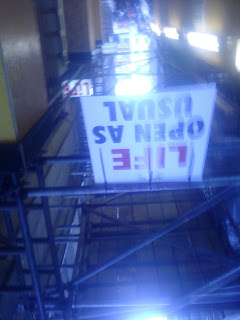I have to think about where I've been, where I am now and where I'm going to next for a university funding application interview.
This is difficult, because a part of me doesn't want to know the answer to any of those questions. Who wants to second guess their future or pin down their past? But here are some initial thoughts.
1) I have been, and still am, basically a lyric poet. That is, a poet of personal experience, a poet who derives much of his material from his own life, from an attempt to understand his own life in the late 20th/early 21st century.
2) My interest in the non-mainstream, the experimental, the frankly bizarre and the extreme complicates that. It's always been there: even when I started I was more fascinated with the strange edges of poetry than a lot of the centre. But I hid it well: I went to readings with mainly mainstream poets because they were the only things available, and even bought the books; while secretly looking at books by Olson, O'Hara, Ashbery; while looking for British equivalents.
3) I found them too: Lee Harwood in a bookshop in Grasmere; the Collected Edwin Morgan lying unreviewed in the City Life offices, ditto with Mina Loy; review copies of Tempers of Hazard; a pamphlet of Geraldine Monk's in Frontline Books in Manchester. Ditto for Penniless Politics by Douglas Oliver.
4) I always did have an interest in the experimental, but I never knew what to do with it until I took a pair of scissors to a crap poem and it became a good one. That released a flood of ideas: turn the poem on its head, write the thing backwards, mix up the verses, stop stop stop making sense!
5) And then it started happening here in Manchester. Suddenly, there was a community of writers I could actually identify with. The readings in the Attic of Alan Fisher, Scott Thurston etc, meeting the editors of Parameter, Matchbox, later ZimZalla and if p then q, feeling part of something exciting happening for the first time.
6) Meanwhile, I'm get older. I spent 20 years trying to fit my poems into a box they didn't want to fit in. Thank goodness I no longer do that. But I don't want to alienate my friends from the Manchester Poets era and say that everything they do/did was rubbish. a) because it's not really true b) because they're all largely nice people.
7) Nevertheless, I do sometimes rubbish their stuff. Sorry about that. When you've felt like square peg in a round hole for 20 years it's easy to say the wrong thing sometimes. What you do is fine; I just no longer want even to try to do it myself. And remember: there are writers I feel I'm supposed to admire that mean nothing to me, so if I rubbish your favourite, it's because I can't see what the fuss is.
8) Reading at The Other Room, in front, as it were, of the home crowd. I bottle it a bit, incredibly nervous like my first reading. And I can't read from thesmall print of my latest pamphlet. Get good reception nevertheless.
9) But where is my writing going? Away from strict cut-n-paste, to a kind of collage, use of found text, forays into conceptual writing; but looking for a spiritual theme in it all. Still basically exploring my own environment and life, trying to understand, to create a poetic analogy to the energy of the life around me. I want the poem to happen now in the reader's head, not to be a record of a happening sometime in the past.
10) I find it puzzling that some poets admit to only writing with a small audience of friends in mind. I want everybody to read my poetry; but without just writing what they want to hear. Writing should be a surprise for the writer and the reader; that Wallace Steven's line about resisting the intelligence almost successfully, and the importance of that ALMOST.
11) Sometimes I feel like Jake the Peg: I still have a foot in mainstream, probably at least a whole leg and a bit in the non-mainstream, and an extra leg in performance. Poetry is an oral art, an aural art, a music, a language, an unread book in the hand and an unexpressed thought in the back of the head, a word on the tip of your tongue.
12) The word that comes out of reviews of my books: the demotic. I'm interested in the language of the street. The language of signage, text, journalism, advertising. At the moment I dip in and out of the academic, and would like to plunge more systematically into it.
13) I would like to do something bigger in the future. I don't know what the future will hold. I'd like to explore my own faith/politics, my own opinions about the world; I would like to find a way of talking about those things that doesn't feel dishonest, disengenuous or otherwise declamatory. I'd like to talk about truth, whatever that means.
14) This is a provisional statement. It will always be a provisional statement.
15) There is no fifteenth statement.


